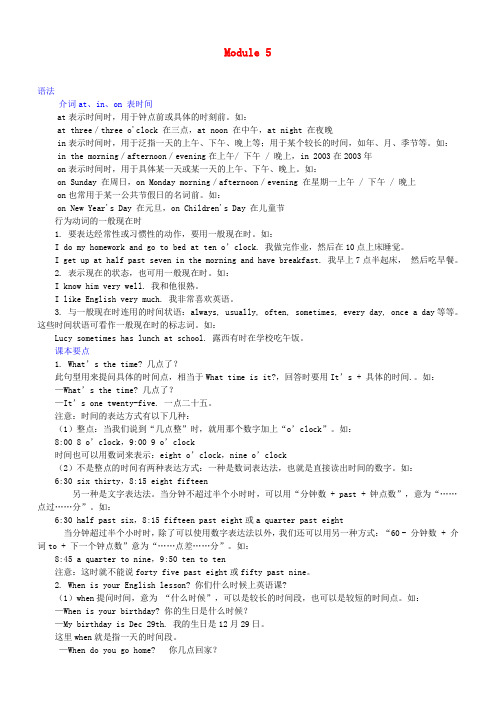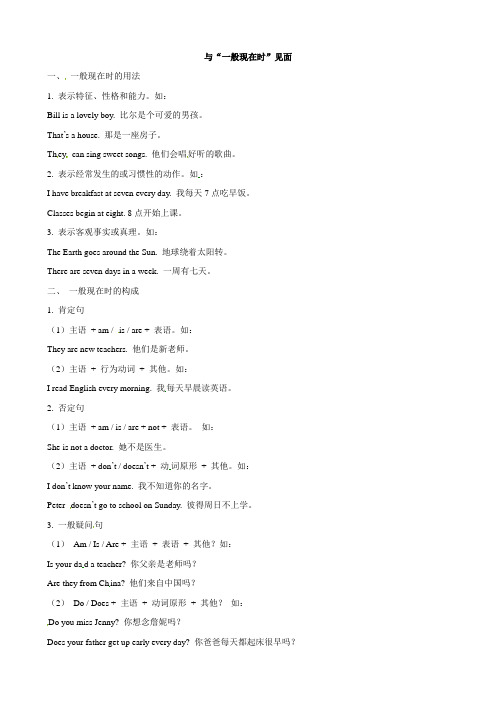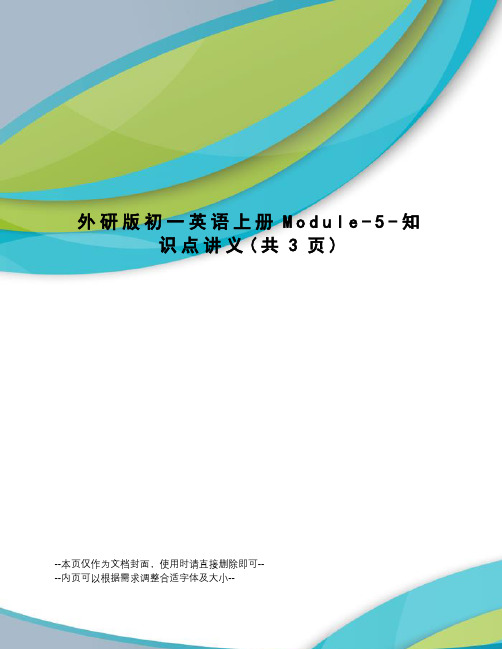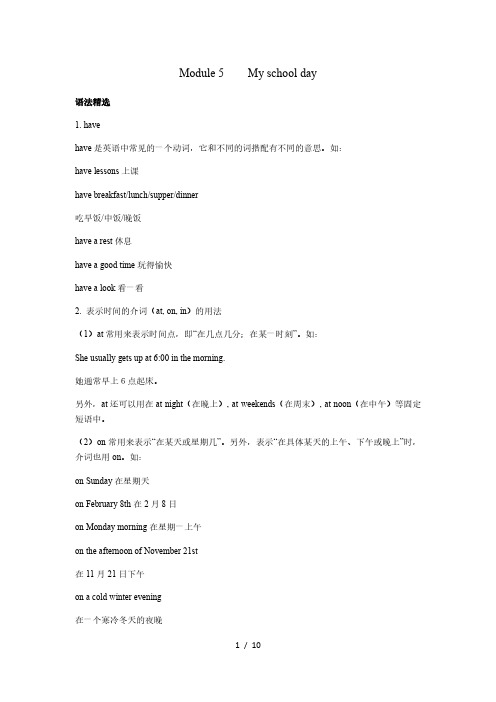第五模块专用 外研版七年级上基础知识点语法,词汇,行为动词的一般现在时
- 格式:doc
- 大小:36.00 KB
- 文档页数:3

Module 5语法介词at、in、on 表时间at表示时间时,用于钟点前或具体的时刻前。
如:at three/three o'clock 在三点,at noon 在中午,at night 在夜晚in表示时间时,用于泛指一天的上午、下午、晚上等;用于某个较长的时间,如年、月、季节等。
如:in the morning/afternoon/evening在上午/ 下午 / 晚上,in 2003在2003年on表示时间时,用于具体某一天或某一天的上午、下午、晚上。
如:on Sunday 在周日,on Monday morning/afternoon/evening 在星期一上午 / 下午 / 晚上on也常用于某一公共节假日的名词前。
如:on New Year's Day 在元旦,on Children's Day 在儿童节行为动词的一般现在时1. 要表达经常性或习惯性的动作,要用一般现在时。
如:I do my homework and go to bed at ten o’clock. 我做完作业,然后在10点上床睡觉。
I get up at half past seven in the morning and have breakfast. 我早上7点半起床,然后吃早餐。
2. 表示现在的状态,也可用一般现在时。
如:I know him very well. 我和他很熟。
I like English very much. 我非常喜欢英语。
3. 与一般现在时连用的时间状语:always, usually, often, sometimes, every day, once a day等等。
这些时间状语可看作一般现在时的标志词。
如:Lucy sometimes has lunch at school. 露西有时在学校吃午饭。
课本要点1. What’s the time? 几点了?此句型用来提问具体的时间点,相当于What time is it?,回答时要用It’s + 具体的时间.。

与“一般现在时”见面一、一般现在时的用法1. 表示特征、性格和能力。
如:Bill is a lovely boy. 比尔是个可爱的男孩。
That’s a house. 那是一座房子。
Th ey can sing sweet songs. 他们会唱好听的歌曲。
2. 表示经常发生的或习惯性的动作。
如:I have breakfast at seven every day. 我每天7点吃早饭。
Classes begin at eight. 8点开始上课。
3. 表示客观事实或真理。
如:The Earth goes around the Sun. 地球绕着太阳转。
There are seven days in a week. 一周有七天。
二、一般现在时的构成1. 肯定句(1)主语+ am / is / are + 表语。
如:They are new teachers. 他们是新老师。
(2)主语+ 行为动词+ 其他。
如:I read English every morning. 我每天早晨读英语。
2. 否定句(1)主语+ am / is / are + not + 表语。
如:She is not a doctor. 她不是医生。
(2)主语+ don’t / doesn’t + 动词原形+ 其他。
如:I don’t know your name. 我不知道你的名字。
Peter doesn’t go to school on Sunday. 彼得周日不上学。
3. 一般疑问句(1)Am / Is / Are + 主语+ 表语+ 其他?如:Is your da d a teacher? 你父亲是老师吗?Are they from Ch ina? 他们来自中国吗?(2)Do / Does + 主语+ 动词原形+ 其他?如:Do you miss Jenny? 你想念詹妮吗?Does your father get up early every day? 你爸爸每天都起床很早吗?4. 特殊疑问句疑问词语+ 一般疑问句?如:What is your brothe r? 你哥哥是做什么工作的?How old are you? 你几岁?。

外研版初一英语上册M o d u l e-5-知识点讲义(共3页)--本页仅作为文档封面,使用时请直接删除即可----内页可以根据需求调整合适字体及大小--Module 5. My school day一、主题:学校和学校生活(School and school life)二、必背单词名词:half 一半 art美术;艺术 geography地理 history历史 IT信息技术maths数学 PE 体育;体育课 lesson(一节)课 subject 科目 weekday工作日 house房子;住宅break(课间)休息 evening晚上 homework家庭作业 bed床 park公园 face 脸minute分钟动词:like喜欢;喜爱 talk谈论,说话 begin开始 start开始 watch看,观看 do做;干wash 洗;洗涤形容词:difficult困难的,难懂的 interesting有趣的 busy忙的;繁忙的副词:o’cloc k ……点钟 then接着,然后 when什么时候,何时介词:past晚于,过(几点) to(距离点时间)差……连词:because因为兼类词:love v.爱;热爱 n.喜爱;关爱 work n.学习;工作 v.学习;工作 sleep n.睡觉 v.睡觉三、常用短语1、having Chinese 上语文课2、at eight o’clock 在8点3、on Monday afternoon 在星期一下午4、in the afternoon/morning/evening 在下午/上午/晚上5、be good at擅长6、my favourite subject 我最喜欢的科目7、talk with 和……交谈8、go to school 上学9、on weekends 在工作日10、get up 起床11、have breakfast/lunch/dinner 吃早/午/晚餐12、have a break休息13、talk to sb. 和某人谈话14、go home 回家15、watch TV看电视16、do one’s homework 做作业17、go to bed 上床睡觉18、go to sleep 开始睡觉;入睡19、do exercise锻炼20、in the day 在白天21、finish school放学22、go swimming去游泳23、play football踢足球24、have music lessons 上音乐课25、play with 和……一起玩四、重点句型1、询问时间:(1)What‘s the time?(2)When is your geography lesson?2、询问课程:(1)What are our lessons on Monday?(2)We have art and history, but we don’t have maths.(3)We start lessons in the afternoon at half past one.3、讨论喜好:(1)I love history and I’m good at it.(2) It’s my favourite subjects because it’s very interesting.(3)I don’t like football.五.模块语法行为动词的一般现在时(1)(We have Chinese at eight o’clock. We don’t have maths.)Revision module A.重点短语• to school 上学• 2. go home 回家• 3. have a healthy breakfast 吃健康早餐• 4. want to do sth 想做……• 5. go swimming 游泳• 6. play football 踢足球•7. play with sb 和…玩耍•8. make apple juice 制作苹果汁•9. in the kitchen 在厨房里•10. do sports 进行体育锻炼重要句子• 1. My favourite day of the week is Saturday.这周我最喜欢的一天是星期六。


初一英语上册(外研版)Module 5 My school day知识点总结一、重点辞汇·原文再现It’s half past six.6点半。
·大体用法half n. 一半(复数形式:halves)It took him half an hour to finish the work.他花了半个小时做完这项工作。
I usually go to bed at half past ten.我通常十点半睡觉。
·知识拓展half 可用于表示时间,英语中时间表达法有:1. 表达整点时,用“基数词+o’clock”,其中o’clock可省略。
2. 表达非整点时,可用“钟点+分钟”,意为“几点几分”。
3. 若是分钟数不超过30,可用“分钟+past+钟点”表达,其中past是介词,意为“超过”。
·出题建议进入语法专练模板,选择数词下的“时刻表达法”,勾选需要的题型,如:单选、完成句子等,同时在关键词中输入:half,就可以够找到用half表示时间的题目了。
·原文再现Betty, what are our lessons on Monday?贝蒂,礼拜一咱们上什么课?·大体用法1. lesson n. 课,是可数名词。
I missed a lesson yesterday.昨天我误了一节课。
2. lesson n. 教训,draw a lesson from… 意为“从…中吸取教训”。
We should draw a lesson from failure.咱们应该从失败中吸取教训。
·知识拓展--相关短语have (a) lessons 上课Today we have a lesson in geometry.今天,咱们有一节几何课。
·原文再现Do you like maths, Tony?你喜欢数学吗,托尼?·大体用法like v. 喜欢(过去式:liked 过去分词:liked 此刻分词:liking 第三人称单数:likes)Do you like pop music?你喜欢流行音乐吗?·知识拓展相关句型/结构like to do/doing 喜欢做某事I like to watch movies/watching movies after class.我喜欢下学后看电影。

Module 5 My school day语法精选1. havehave是英语中常见的一个动词,它和不同的词搭配有不同的意思。
如:have lessons上课have breakfast/lunch/supper/dinner吃早饭/中饭/晚饭have a rest休息have a good time玩得愉快have a look看一看2. 表示时间的介词(at, on, in)的用法(1)at常用来表示时间点,即“在几点几分;在某一时刻”。
如:She usually gets up at 6:00 in the morning.她通常早上6点起床。
另外,at还可以用在at night(在晚上), at weekends(在周末), at noon(在中午)等固定短语中。
(2)on常用来表示“在某天或星期几”。
另外,表示“在具体某天的上午、下午或晚上”时,介词也用on。
如:on Sunday在星期天on February 8th在2月8日on Monday morning在星期一上午on the afternoon of November 21st在11月21日下午on a cold winter evening在一个寒冷冬天的夜晚(3)in表示“在某一段时间”,如某年、某月、某个季节。
如:in 1998 在1998年in March在三月in summer在夏天另外,在某一些固定短语中要用in。
如:in the morning在早上in the evening在晚上in the day在白天in the middle of the day在中午句法精析1. What’s the time? 几点了?在英语中,常用“What’s the time?”或“What time is it?”来询问时间,有时也可用“Do you know the time?”等句式来问时间。
回答均用“It’s...”。
七年级上册英语知识点外研版m5七年级上册英语知识点外研版m5重点内容包括:一、语法1. 一般现在时一般现在时用来表示经常性、习惯性的动作或状态。
结构:主语+谓语动词(原形)+其他例如:He often gets up early.(他经常早起)2. 现在进行时现在进行时用来表示现在正在发生的动作。
结构:主语+be动词(am/is/are)+现在分词+其他例如:She is reading a book now.(她正在读一本书)3. 一般过去时一般过去时用来表示已经发生的动作。
结构:主语+谓语动词(过去式)+其他例如:They went to the park yesterday.(他们昨天去了公园)4. 现在完成时现在完成时用来表示过去已经完成的动作对现在造成的影响或状态。
结构:主语+have/has+过去分词+其他例如:I have finished my homework.(我已经完成了我的作业)二、词汇1. 表示事情的词汇例如:amazing(令人惊奇的)、dangerous(危险的)、exciting(令人兴奋的)、noisy(嘈杂的)、peaceful(和平的)、quiet(安静的)、terrible(可怕的)、wonderful(精彩的)2. 表示衣服的词汇例如:coat(外套)、dress(连衣裙)、jeans(牛仔裤)、shirt(衬衫)、shoes(鞋子)、skirt(裙子)、socks(袜子)、sweater(毛衣)、T-shirt(T恤衫)3. 表示家庭成员的词汇例如:aunt(姑妈/舅妈)、brother(兄弟)、cousin(表兄弟/表姐妹)、father(父亲)、grandfather(祖父)、grandmother (祖母)、mother(母亲)、sister(姐妹)、uncle(叔叔/舅舅)三、阅读理解阅读理解是英语学习的重要环节之一,通过阅读可以提高语感和阅读能力。
Module 5My school day模块语法聚焦五一般现在时的用法(一)一、定义:1.表示__经常性__ 或__习惯性__ 的动作,常与表示频度的时间状语连用,如everyday, often, sometimes等。
例如:I leave home for school at 7:00 every morning.我每天早上七点离开家去上学。
二、用法:1.表示真理、客观事实和科学事实时用一般现在时。
例如:The earth moves around the sun.地球围绕太阳转。
2.用于格言或警句。
例如:Pride goes before a fall. 骄必败。
3.表示现在的特征或状态、能力、性格、个性等。
例如:I'm happy.我很高兴。
三、分类:一般现在时态分为__be__ 动词的一般现在时和__实义__ 动词的一般现在时。
1.be 动词的一般现在时态:(1)肯定句:主语+be动词(am/is/are)+其他.(2)否定句:主语+be动词(am/is/are)+not+其他.(3)一般疑问句:Be动词(Am/Is/Are)+主语+其他?2.实义动词的一般现在时态:实义动词的一般现在时分为主语是非第三人称单数和第三人称单数两种。
本模块我们学习主语是非第三人称单数的一般现在时形式。
(1)肯定句:主语+动词原形+其他. 例如:I live far away from school. 我住得离学校很远。
(2)否定句:主语+助动词don't+动词原形+其他. 例如:I don't live far away from school.我住得离学校不远。
(3)疑问句:Do+主语+动词原形+其他?例如:—Do you live far away from school?—Yes, I do./No, I don't.“你住得离学校远吗?”“是的,远。
”/“不,不远。
七年级外研社知识点在七年级外研社英语学习中,有一些重要的知识点需要掌握。
本文将对这些知识点进行详细介绍。
一、基本语法1. 一般现在时一般现在时表示经常发生的动作或者客观事实。
例如:I play basketball every Sunday. (我每个星期天打篮球。
)2. 一般过去时一般过去时表示过去发生的动作或者状态。
例如:I watched a movie last night. (我昨晚看了一场电影。
)3. 现在进行时现在进行时表示正在进行的动作。
例如:I am studying English now. (我现在正在学英语。
)4. 一般将来时一般将来时表示将要发生的动作。
例如:I will go to the park tomorrow. (我明天会去公园。
)二、基本句型1. 主语+谓语这个句型最简单,主语(通常是名词或代词)加上谓语(也就是动词),可以用来表达很多不同的意思。
例如:She runs.(她跑步。
)2. 主语+谓语+宾语这个句型需要在主语和谓语之间加入一个宾语。
宾语通常是名词或代词。
例如:He drinks tea. (他喝茶。
)3. 主语+be动词+表语这个句型需要用到“be动词”,它表示状态或者特点。
表语通常是名词或形容词。
例如:She is tall. (她很高。
)4. 主语+助动词+谓语这个句型需要用到助动词和谓语。
助动词用来表示情态,如can、should、may等。
谓语表示动作或状态。
例如:I can swim. (我会游泳。
)三、常见短语和句型1. What's your name?(你叫什么名字?)2. How old are you?(你多大了?)3. Where do you live?(你住在哪里?)4. My name is…(我的名字是……)5. I am 13 years old.(我13岁。
)6. I live in Beijing.(我住在北京。
第五模块知识点归纳与复习单元知识清单重点单词[hɑːf][pɑːst] [ə'klɒk][tuː] [ɑ:t][dʒɪ'ɒgrəfɪ] ['hɪst(ə)rɪ] [,aɪ'tiː] [mæθs] [,p iː'iː] ['lesən])[ðen][laɪk]['dɪfɪk(ə)lt] [lʌv]['sʌbdʒɪkt][bɪ'kɒz]['ɪntrəstɪŋ][tɔ:k][bɪ'gɪn][wen]上学['wiːkdeɪ]起床吃早餐[haʊs][stɑ:t][wɜːk][breɪk]吃饭;吃晚餐回家['ɪːv(ə)nɪŋ][wɒtʃ]吃饭;吃晚餐[duː]['həʊmwɜːk][bed]上床睡觉[sli:p]开始睡觉;入睡[pɑ:k]['bɪzɪ][wɒʃ][feɪs]['mɪnɪt]必会短语1.在星期一_____________________________2.在八点_______________________________3.在六点半_____________________________4.上语文课_____________________________5.在早上_______________________________6.在下午_______________________________7.擅长_________________________________8.吃早饭_______________________________9.吃午餐_______________________________10.吃晚餐_______________________________11.上学_________________________________ 12.起床_________________________________13.回家_________________________________14.看电视_______________________________15.做家庭作业___________________________16.睡觉_________________________________17.上床睡觉_____________________________18.休息一下_____________________________19.在白天_______________________________20.去游泳_______________________________21.放学后_______________________________22.和某人一起玩_________________________重点句式1.贝蒂,我们星期一的课是什么?Betty, _______ ________ our lesson in Monday?2.我们8点上语文课,8点55分上科学。
We ________ Chinese _________ eight o’clock and science______ five to nine.3.托尼,你喜欢数学吗?________ you ______ maths , Tony?4.星期五我们上什么课?_________ ________ ________ we have on Friday?5.它是我最喜欢的科目,因为它很有趣。
It’s my favourite subject _________ it’s very interesting.6.我在工作日上学,但是不是在星期六和星期天。
I go to school on weekdays , ________ _______ onSaturday and Sunday.7.我早上七点半起床,然后吃早饭。
I get up at half past seven in the morning, _______ ________ havebreakfast.8.我最喜欢的学科是美术。
My _________ _________ is art.9.他们去操场踢足球,但是我不喜欢足球。
They go to the playground and play football, ________ I_______ _________ football.10.我喝果汁或者水。
I drink juice ________ _________.11.我在晚上看电视,和家人一起吃晚饭。
In the evening, I watch TV ______ have dinner ______ my family. 知识点1 词语运用A. 根据句意及首字母或汉语提示完成单词或短语。
1. What is your favourite s________? --- It’s Chinese.2. It’s d________ for me to learn English well.3. Do you want to have g____________? --- Yes, it’s my favourite subject .4. He is unhealthy, b________ he eats too much meat.5. We have four l________ in the morning on Monday.6. When do you start your first lesson? --- At half p_______ eight.7. We have h_________ in the afternoon.8. It’s eleven __________(点钟).9. I think _________(信息技术) is very hard for me.10. Our __________(数学) teacher is from a small city.11. When do you _________(开始) your lessons?12. I do my __________(作业) at 7:00 pm every day.13. Please have a ___________(休息) after class.14. What time do you _____________(起床) in the morning.15. I _________________(上床睡觉) at 8:00 in the evening.B. 根据汉语提示完成句子。
1. This is my _________ ___________(上学日).2. Tom often _________ _________(起床) at half past seven.3. Let’s __________(谈论) about our homework.4. We go to school __________ Monday ________(从…到…)Friday.5. We have meat _________(和) rice for lunch.知识点2 语法演练A.用所给动词的适当形式填空。
1. You _________(have ) lunch at school, right?2. Lessons __________(start) at nine o’clock on weekdays.3. We __________(not go) to school on Sunday.4. They have history in the morning , but we __________(not have).5. I can ________(play) football on the playground in the afternoon, but I _________(not like ) football.6. Li Ming often __________(go) to school by bike.7. This boy _________(come) from America.8. I often ________(get) up at six.B. 句型转换。
1.I have lunch at school. (改为否定句) I ________ _______ _______ at school.2. Lessons start at 8:00. (对划线部分提问) ________ _________ _________ lessons start?3. It’s Thursday today. (对划线部分提问)________ ________ is it today?4. We have three lessons in the morning. (对划线部分提问) _____ ____ lessons ___ you have in the morning?5. We have four lessons in the morning. (变为一般疑问句) _____ you ______ four lessons in the morning?6. We have a break . We talk to our friends. (合并为一句) We have a break _____ ______ _____ our friends.7. I have art this afternoon. (改为否定句) I _______ ________ _________ this afternoon.8. I like healthy food. (改为一般疑问句) ______ ______ _______ healthy food?9. Their science is at nine o’clock. (对划线部分提问) _________ __________ their science?10. She does the housework every day. (改为否定句) She ______________ the housework every day.--- Well begun is half done.好的开始是成功的一半。